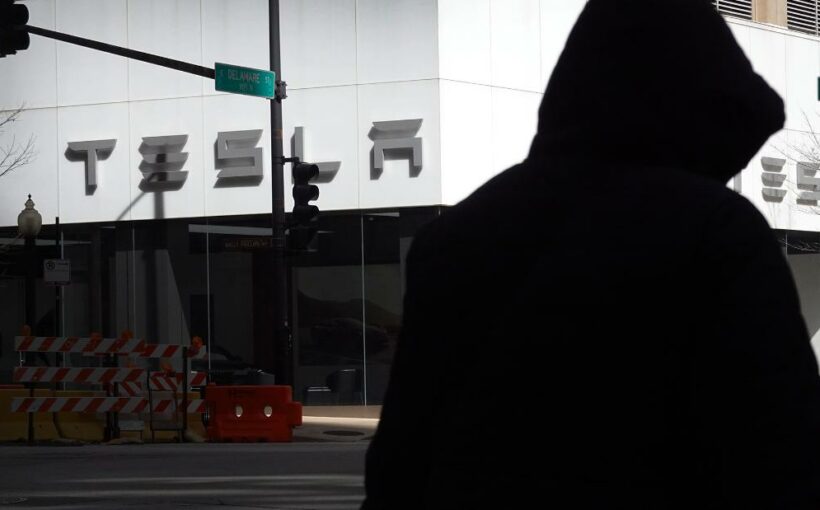Kara Alaimo, an associate professor in the Lawrence Herbert School of Communication at Hofstra University, writes about issues affecting women and social media. She was spokeswoman for international affairs in the Treasury Department during the Obama administration. The opinions expressed in this commentary are her own.
Earlier this week, Tesla CEO Elon Musk sent emails announcing that the company’s employees all have to be in the office full time — or else.
“Anyone who wishes to do remote work must be in the office for a minimum (and I mean *minimum*) of 40 hours per week or depart Tesla,” he wrote. He also said that he would personally review every employee request for an exemption but that, generally, “If you don’t show up, we will assume you have resigned.”
In announcing this draconian policy that disregards the needs, desires and realities of many American workers, Musk probably thinks he’s going to extract more and better work out of his staff. He’s sadly mistaken. The policy is likely to have the exact opposite effect, driving talent and innovation out of his electric vehicle company.
To state the obvious, Tesla’s policy ignores the 60% of Americans with jobs that can be done remotely who say they want to work from home all or most of the time even after Covid, according to a 2022 Pew Research Center survey. Women and members of marginalized groups are especially likely to want to work from home all or part of the time because of either a lack of child care, other demands at home, or because they often feel excluded in their office environments. According to a recent survey of 10,800 knowledge workers around the globe by Future Forum, a consortium focused on flexible work that is supported by Slack, 77% of White workers, 81% of Black workers, 82% of Asian/Asian American workers and 79% of Hispanic/Latinx workers want hybrid or remote working arrangements. And 58% of working mothers want to work from home all or most of the time, compared to 48% of working dads.
But Musk’s policy isn’t just bad for his workers. It’s also likely to be bad for business.
This is partly because, contrary to Musk’s outdated beliefs, workers overwhelmingly say they’re not more productive when they work full time from the office. In fact, 80% of hybrid and remote workers said in a 2022 survey conducted by Edelman Data x Intelligence for Microsoft that they’re equally or more productive than they were when they worked from the office.
What’s more, this policy will almost certainly cause a staff exodus from Tesla. American workers are already jumping ship from their employers in record numbers as part of the “Great Resignation,” with about half of workers looking for a new job or at risk of leaving, partly because they’re looking for more flexible options, according to a survey conducted by Willis Towers Watson, an insurance and risk management company.
Tesla’s policy will also likely make it harder for the company to attract top talent in the future. After all, why work for a place that doesn’t account for staff needs when you can easily get a job somewhere else in today’s tight labor market? Companies are in hiring wars to attract staffers, with nearly two jobs open for every American seeking work right now.
And, since women and members of marginalized groups are most likely to want to work from home, they’re also especially likely not to want to work for Tesla. This will leave the company with a more homogenous workforce, comprised mostly of men who have the privilege to be able to disappear from their homes and families for more than 40 hours per week — such as those who have spouses they can rely on to take care of the kids when their classroom unexpectedly shuts down for a week because a student gets Covid.
Cultivating a homogeneous workforce is not a strategy for success. According to research by McKinsey, companies that are more diverse significantly outperform those that are not. For example, in 2019, companies that were the most ethnically and culturally diverse were 36% more profitable than those that were least diverse. And companies with the most gender diversity were 25% more likely to have higher than average profitability than those with the least gender diversity. This makes sense, of course, since people who are similar tend to think alike. Groups that are more diverse come up with more out-of-the-box approaches and ideas — which, incidentally, is exactly what you need if you’re trying to create the vehicles of the future.
Tesla’s new policy will likely hurt many of its workers who want and need flexibility. But I predict the biggest loser of all will be the company itself. Implementing a policy that won’t improve productivity, will make workers flee and will likely stifle diversity and innovation is not a winning strategy.
Source: Read Full Article

